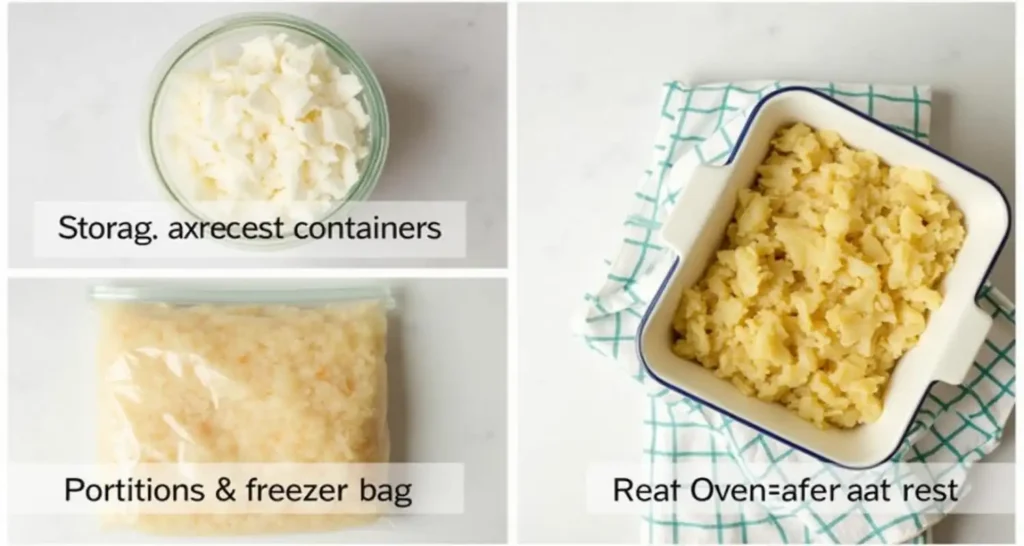Table of Contents
A Glimpse into Coal Miner’s Kitchens
Imagine the comforting aroma of a coal miner’s recipe for sauerkraut filling a kitchen after a hard day’s work. The air is filled with the comforting aroma of sauerkraut slowly simmering on the stove, its tangy scent blending with the rich, smoky notes of sizzling sausage. A warm cast-iron skillet sits at the center of the modest kitchen, crackling softly over the flame. The table is set with simple, sturdy dishes—each place ready for a meal designed not just to satisfy hunger but to replenish strength and bring a sense of solace after a hard day underground.
This coal miner’s recipe for sauerkraut isn’t just food—it’s a symbol of resilience and resourcefulness. In its simplicity lies a deep connection to heritage, where meals were crafted from ingredients that were affordable, hearty, and packed with flavor. Today, this dish holds its relevance not only as a comfort food but also as a bridge to tradition. It’s a reminder that even the most unassuming ingredients can create something extraordinary. Whether for a nostalgic meal or a simple family dinner, the coal miner’s recipe for sauerkraut delivers history and flavor in every bite.
Why You’ll Love This Recipe
The coal miner’s recipe for sauerkraut is more than just a dish—it’s a celebration of tradition, simplicity, and rich, satisfying flavors.
Here’s why this traditional sauerkraut recipe deserves a place in your meal rotation:
Quick and Simple
Specialty items or lengthy cooking times aren’t required for this dish. Most of the ingredients—like onions, garlic, and broth—are pantry staples. This means you can whip it up without a last-minute grocery run, making it perfect for busy days.
Rich, Tangy Flavor
The combination of sauerkraut’s natural tang with smoky sausages or your choice of protein creates a deeply satisfying dish. The addition of subtle spices and optional sweetness balances the flavors beautifully, leaving you craving more.
Versatile for Any Occasion
This traditional sauerkraut recipe is ideal for a casual lunch or a hearty dinner, offering a taste of rustic simplicity. Pair it with mashed potatoes for a cozy meal at home or serve it alongside crusty bread for an elegant yet simple dining experience.
Customizable to Your Taste
Whether you prefer a traditional approach with bratwurst or a vegan twist using tempeh, this recipe adapts effortlessly. You can also adjust the tanginess, sweetness, or spice level to match your preferences.
A Nod to Heritage
Beyond its flavor, this recipe connects you to a history of resilience and ingenuity. It’s a meal that tells a story, making every bite a step back in time.
Coal Miner’s Recipe for Sauerkraut
Course: Lunch, also suitable for dinnerCuisine: Rustic EuropeanDifficulty: Easy4
servings10
minutes30
minutes250
kcal40
minutesThis hearty and tangy sauerkraut dish, inspired by coal miner traditions, pairs perfectly with your choice of protein and is a comforting option for lunch or dinner. Simple to make yet packed with flavor, it’s a classic meal with modern versatility.
Ingredients
2 cups sauerkraut (drained slightly)
1 medium onion, finely chopped
2 cloves garlic, minced
1 tablespoon olive oil or butter
1 cup vegetable or chicken broth
2 sausages or 1 cup of plant-based protein (e.g., tofu or tempeh)
1 teaspoon caraway seeds (optional)
2 bay leaves
1/2 cup apple cider or beer (optional)
Salt and pepper, to taste
Optional: 1 small apple, grated, or 1 tablespoon brown sugar for sweetness
Directions
- Heat olive oil or butter in a skillet and sauté onions and garlic until golden and fragrant.

- Add sauerkraut, coat it well in the onion mixture, and place protein on top.

- Pour in broth and optional apple cider or beer, season with caraway seeds and bay leaves, then cover and simmer for 30 minutes.

- Uncover for the last 10 minutes for caramelization if desired, then remove bay leaves and adjust seasoning before serving.


Notes
- If the sauerkraut is too tangy, rinse it lightly under cold water before cooking.
Pair with mashed potatoes or crusty bread for a complete meal.
For a vegan version, use vegetable broth and replace sausages with tempeh or tofu. - Nutritional Value (Approximate Per Serving)
Calories: 250 / Protein: 12g / Fat: 10g / Carbohydrates: 20g / Fiber: 4g / Sodium: 800mg
Secrets to the Ingredients in a Coal Miner’s Recipe for Sauerkraut
Every ingredient in this coal miner’s recipe for sauerkraut plays a role in creating its unique flavor profile. Let’s break down the essentials and explore ways to customize or substitute them.
Sauerkraut
As a fermented cabbage dish, sauerkraut brings its signature tanginess to the forefront, making it the heart of this recipe.
- Fresh vs. Canned: Fresh sauerkraut (found in the refrigerated section) has a crisp texture and vibrant flavor, while canned varieties are softer and more muted. Use fresh for a brighter taste, or opt for canned if you prefer a milder profile.
- Customizing Tang: If you want a less tangy flavor, rinse the sauerkraut lightly before cooking.
Protein Choices
Traditionally, sausages or smoked meats are used, but there are plenty of alternatives:
- Classic Options: Bratwurst, or kielbasa, adds a smoky depth.
- Plant-Based Alternatives: Tempeh, tofu, or even hearty mushrooms work well for vegan or vegetarian versions.
- Gluten-Free Tip: Ensure your protein (like sausage) is labeled gluten-free if needed.
Seasonings
- Bay Leaves: These add subtle earthiness and complexity. Remove them before serving.
- Caraway Seeds: Provide a nutty, slightly peppery flavor. Substitute with fennel seeds for a milder, sweeter alternative.
- Optional Additions: A splash of apple cider or beer enhances the tang, while grated apples or brown sugar add a touch of sweetness.
Substitution Ideas
- Replace broth with vegetable stock for a vegan option.
- Swap out caraway seeds for mustard seeds to add a slight sharpness.
- Use lentils or chickpeas as a hearty, plant-based protein alternative.
Health Benefits of Sauerkraut

Why Sauerkraut is a Superfood
This fermented cabbage dish isn’t just flavorful; it’s also a nutritional powerhouse that offers probiotics and essential nutrients. Its unique preparation process of fermentation boosts its benefits, making it a standout choice for balanced diets.
1. Packed with Probiotics
Fermentation creates beneficial bacteria, known as probiotics, which support gut health. A healthy gut improves digestion, boosts the immune system, and can even elevate your mood by fostering the gut-brain connection.
2. Rich in Nutrients
This fermented cabbage dish is low in calories but rich in essential nutrients like Vitamin C and fiber. It’s particularly high in:
- Vitamin C: Boosts immunity and skin health.
- Vitamin K: Supports bone health and blood clotting.
- Iron: Essential for producing energy and transporting oxygen throughout the body.
3. Perfect for Balanced Diets
Whether you’re eating keto, low-carb, or simply looking for nutrient-dense options, sauerkraut fits effortlessly into most meal plans. Its high fiber content helps you feel full longer, making it a great addition to weight management.
4. Natural Preservative-Free Food
Unlike many processed foods, sauerkraut is naturally preserved. Choosing fresh or homemade varieties ensures you’re consuming a clean, wholesome product.
Easy Steps for a Successful Coal Miner’s Sauerkraut Recipe
Follow these steps to recreate the coal miner’s recipe for sauerkraut with ease, ensuring a flavorful and satisfying result every time.
1. Prepare Your Ingredients
Gather and prepare all your ingredients before beginning to cook. Drain the sauerkraut slightly to remove excess liquid if desired. Chop the onions finely and mince the garlic for a consistent texture.
2. Sauté the Aromatics
In a large cast-iron skillet, heat 1 tablespoon of olive oil or butter over medium heat. Add the diced onion and sauté until it turns soft and golden, about 5 minutes. Then, stir in the minced garlic and cook for another minute to release its fragrance. The goal here is to build a flavorful base.
- Tip: Keep stirring to prevent the garlic from burning, as it can turn bitter.
3. Add the Sauerkraut
Stir in the sauerkraut to replicate the rich flavors of a traditional German sauerkraut dish. Allow it to cook for 2-3 minutes so the flavors can blend.
- Safety Note: If using a cast-iron skillet, use oven mitts or heat-proof handles to avoid burns.
4. Incorporate Protein and Liquid
Nestle your protein of choice (sausages, or plant-based alternatives) on top of the sauerkraut. Pour in 1 cup of broth and a splash of apple cider or beer, if using. Add bay leaves and sprinkle with caraway seeds for extra flavor.
- Tip: If using plant-based proteins, cook them separately first to achieve a crispy texture before adding them to the dish.
5. Simmer to Perfection
Place a lid on the skillet and lower the heat to a gentle simmer. Allow the coal miner’s recipe for sauerkraut to simmer gently for 30 minutes, letting the flavors meld together beautifully. This step helps the ingredients meld together harmoniously.
- Bonus Tip: For a caramelized touch, uncover the skillet during the last 10 minutes of cooking to brown the sauerkraut slightly.
6. Adjust and Serve
Take out the bay leaves and adjust the seasoning with salt and pepper as needed. Complete this hearty sauerkraut meal by serving it with classic sides like mashed potatoes or crusty bread.
Expert Tips for Success
Creating the perfect coal miner’s recipe for sauerkraut isn’t just about following the recipe—it’s about adding your touch and ensuring every step enhances the flavors. These expert tips will help you elevate your dish and make the most of every ingredient.
1. Seasoning Secrets
- Layer Flavors Gradually: For the best flavor in your hearty sauerkraut meal, layer seasonings early in the process to allow their aromas to infuse fully into the sauerkraut. Adjust salt and pepper toward the end to avoid over-salting.
- Balance Tanginess: If your sauerkraut feels too sharp, a pinch of brown sugar or a splash of apple cider can round out the flavors.
2. Storage Made Simple
- Refrigeration: Transfer leftovers to an airtight container. Stored properly, sauerkraut can stay fresh in the fridge for up to 4 days.
- Avoid Odor Issues: If the sauerkraut is too pungent, double-wrap the container in plastic or use a vacuum-sealed bag to minimize odor.
3. Pair It Perfectly
- Beverage Pairings: Try sparkling water infused with lemon or cucumber for a light, tangy counterbalance.
4. Cooking Tools Matter
- Use Cast Iron for Authentic Flavor: A cast-iron skillet imparts a smoky, rustic taste, but always handle it with care using oven mitts. If you prefer non-stick pans, add an extra splash of oil to prevent sticking.
Pairing Sauerkraut with Global Flavors
Going Beyond European Borders
Although a German sauerkraut dish is a classic, its tangy flavor makes sauerkraut a versatile addition to global cuisines.

1. Sauerkraut Tacos
Take taco night to a new level by adding sauerkraut. Its acidity cuts through the richness of meats like pulled or brisket, providing a refreshing contrast. Top with fresh cilantro and a drizzle of lime crema for a fusion-inspired dish.
2. Ramen Bowl Upgrade
Add sauerkraut to ramen for a bold, tangy twist. It pairs particularly well with rich, miso-based broths and can complement toppings like soft-boiled eggs, mushrooms, and sesame seeds.
3. Sauerkraut Fried Rice
Stir sauerkraut into fried rice for a zesty pop of flavor. Combine with vegetables, soy sauce, and scrambled eggs for a quick, tangy Asian-inspired dish.
4. Barbecue Pairings
Use sauerkraut as a topping for barbecued dishes like brisket or ribs. The tanginess enhances smoky flavors, balancing the richness of grilled meats.
5. Fusion Salads
Toss sauerkraut into salads with Middle Eastern or Mediterranean flavors. Combine it with cucumbers, olives, and a tahini dressing for a refreshing, zesty side dish.
Variations and Customizations: Make It Your Own
The beauty of this coal miner’s recipe for sauerkraut is its adaptability. From regional twists to surprising serving ideas, there’s no shortage of ways to make it your own.
1. Regional Adaptations
- Polish Style: Add smoked kielbasa, a generous amount of black pepper, and diced potatoes for a heartier meal.
- German Flair: Enhance this German sauerkraut dish with bratwurst and a dollop of Dijon mustard for bold, authentic flavors.
- French Twist: Serve with duck confit and a side of creamy gratin potatoes for a luxurious spin.
2. Unexpected Twists
- Sauerkraut Flatbread: Use the sauerkraut as a tangy topping on flatbread, layered with caramelized onions and melted Gruyère cheese.
- Breakfast Option: Top the dish with a poached or fried egg for a hearty brunch meal.
- Sweet and Spicy: Stir in a small handful of raisins and a pinch of chili flakes for an unexpected burst of flavor.
Serving Suggestions: Make Every Meal Memorable
Serving this traditional sauerkraut recipe family-style enhances its rustic charm. Here are some creative ways to serve this sauerkraut dish and the sides that bring it to life.

1. Presentation Ideas
- Family-Style Feast: This traditional sauerkraut recipe shines when served straight from a cast-iron skillet, preserving its rustic charm. Let guests help themselves, creating a cozy, communal atmosphere.
- Charcuterie Board Accent: Place a small portion of sauerkraut alongside cured meats, cheeses, and crackers for a modern twist on a traditional pairing.
- Rustic Elegance: Plate individual portions with a garnish of fresh parsley or thyme for a polished look.
2. Perfect Pairings
- For Texture: Pair with creamy mashed potatoes or crusty bread to complement the sauerkraut’s tangy softness.
- For Flavor: Add roasted root vegetables or a crisp side salad with apples and walnuts to provide contrast and balance.
Storage and Reheating Instructions
A coal miner’s recipe for sauerkraut is not only delicious but also easy to store and reheat for future meals. Here’s how to preserve its flavor and texture for future meals.

1. Storage Tips
- Refrigerate: Place the cooled sauerkraut dish in an airtight container. Keep it refrigerated for up to 4 days.
- Freeze: Freeze portions by storing them in airtight, freezer-safe containers or resealable bags. Freeze for up to 3 months. For best results, lay the bags flat in the freezer to save space.
2. Reheating Instructions
- Microwave: Place a portion in a microwave-safe bowl. Cover with a damp paper towel and heat in 30-second intervals, stirring in between to avoid drying out.
- Stovetop: Reheat in a skillet over medium-low heat. Add a splash of broth or water to prevent sticking and stir occasionally until warm.
- Oven: Preheat to 350°F (175°C). To reheat one of your favorite comfort food recipes, transfer the dish to a covered, oven-safe container and bake for 15-20 minutes.
Related Recipes You’ll Love
If you’ve enjoyed this coal miner’s recipe for sauerkraut, you’ll love exploring these complementary dishes. Each one pairs beautifully with sauerkraut or offers a hearty, rustic charm inspired by traditional flavors.
1. Charcuterie Box Lunch Recipes
Packed with an assortment of cured meats, cheeses, and pickled vegetables, this recipe brings together bold flavors and textures in a portable, visually appealing meal.
- Why It Pairs Well: The tanginess of sauerkraut complements the saltiness of cured meats, making it an excellent addition to any charcuterie spread.
2. Old Fashioned Salmon Patties Recipe
These crispy, golden salmon patties are a nostalgic favorite made with simple ingredients like canned salmon, breadcrumbs, and spices.
- Why It Pairs Well: Sauerkraut’s tanginess cuts through the richness of salmon patties, creating a perfectly balanced meal. Serve them together for a fusion of seafood and traditional flavors.
3. Beef Pepper Steak with Rice
This classic dish combines tender strips of beef, bell peppers, and a savory sauce served over fluffy white rice.
- Why It Pairs Well: Sauerkraut adds a bright, acidic contrast to the savory richness of the beef, elevating the dish to new flavor heights.
A sizzling hot dish of tender beef or chicken served with rice, vegetables, and a flavorful pepper sauce.
- Why It Pairs Well: Add a scoop of sauerkraut to this sizzling meal to bring a zesty tang that complements the bold peppery flavors.
This customizable recipe layers seasoned meat, fresh veggies, beans, and rice in a single bowl for a vibrant, satisfying meal.
- Why It Pairs Well: Swap out traditional toppings for sauerkraut to create a fusion taco bowl with a tangy, refreshing twist that’s sure to delight.
These recipes not only offer variety but also highlight the versatility of sauerkraut as a complement to various cuisines. Try pairing these dishes with sauerkraut for a bold, delicious twist on familiar flavors!
Frequently Asked Questions (FAQs)

Can fresh cabbage work as a substitute for this fermented cabbage dish?
Yes, but you’ll need to ferment it to replicate the tangy flavor of sauerkraut. Alternatively, you can sauté fresh cabbage with vinegar and a pinch of sugar for a quick substitute.
What makes a coal miner’s recipe for sauerkraut unique?
This dish originated in Europe, where sauerkraut was a staple food due to its long shelf life. It became popular among coal miners for its affordability and nutritional value, providing sustenance during demanding workdays.
Is sauerkraut good for weight loss or gut health?
Absolutely! Sauerkraut is low in calories and high in fiber, making it filling without being heavy. It’s also rich in probiotics, which promote healthy digestion and gut health.
Can I make this dish ahead of time?
Yes, this dish tastes even better the next day as the flavors deepen. Store it in the fridge and reheat it following the instructions above.
What’s the best protein to pair with sauerkraut?
Traditional options like bratwurst work wonderfully, but plant-based proteins like tempeh or mushrooms are also excellent for a modern twist.
Bringing Tradition to Your Table
This coal miner’s recipe for sauerkraut combines history, flavor, and versatility in one hearty dish. Whether you’re serving it for lunch or dinner, it’s sure to be a crowd-pleaser that brings comfort and nostalgia to your table.
Try one of the most satisfying comfort food recipes today and let us know how your twist on this sauerkraut dish turned out? Tell us how yours turned out in the comments—we’d love to hear your thoughts!







